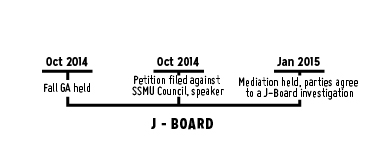On Jan. 17, Judicial Board (J-Board) case Khan and Syed v. Students’ Society of McGill University (SSMU) Council and Speaker was resolved through a mediation session. Participants signed an agreement mandating the J-Board to investigate and make recommendations on whether adaptations to Robert’s Rules should be adopted in regards to motions to postpone indefinitely during General Assemblies (GAs). The motion to postpone indefinitely prescribed by Robert’s Rules currently allows participants in a meeting to not decide on a motion, while also avoiding the possibility of bringing up the motion later.
The mediation session followed a petition filed by Zain Ali Syed and Nadir Khan over the Speaker’s practices at the SSMU GA held on Oct. 22. The petition accused the Speaker of stifling discussion on a motion that called for SSMU to stand in solidarity with the people of Palestine at the Fall GA by allowing an indefinite postponement to go through. In effect, the mediation agreement has terminated the proceedings of the suit.
The mediation agreement states that both parties have agreed to resolve their differences on the basis of the following two questions that the J-Board will be investigating.
“Does a special two-thirds majority rule instead of a simple majority for the ‘Motion to Postpone Indefinitely’ constitute a valid standing rule according to Article 5.3.3 of By-Law Book 1-5?” the first question reads, challenging whether the number of votes needed for the motion to pass can be raised.
“[The J-Board will] analyze and clarify the meaning of Article 5.2. of By-Law book 1-5. If the J-Board deems that there is an obligation, it shall elaborate on the nature and extent of the obligation therein implied,” the second question reads.
Article 5.2 of SSMU’s bylaws specifies that standing rules for GAs must be adopted by Council at least one week in advance and publicized five calendar days before the meeting. Article 5.3 adds that “the General Assembly may amend resolutions and motions in accordance with the standing rules.”
The investigation, starting immediately, will be overseen by Chief Justice of the J-Board Munavvar Tojiboeva. Tojiboeva is expected to clarify the constitution and outline the procedures to follow, although she did not specify the time frame in which SSMU would have to change its by-laws if requested to do so by the J-Board.
“I am [planning] on having the report ready by the end of February,” Tojiboeva said. “It all depends on whether the questions are answered [by the J-Board] in the affirmative or the negative and what the recommendations will be [….] Maybe there will be nothing to ratify if the answer to the questions is negative.”
The agreement also specifies that if the J-Board deems that there is an obligation regarding question 2, the J-Board must outline the procedures for SSMU to comply with the decision it will make.
“The rules of the GA have being reviewed in the past.” Tojiboeva explained. “I believe last time the By-Law Book I-5 has been changed, but I am not aware of when it has been done.”
“I am happy that we were able to come to a common ground with the petitioners that everyone is content with,” SSMU President Courtney Ayukawa said, highlighting that the agreement is non-binding. “What proceeds after the J-Board makes their recommendations is mostly up to how the [SSMU] Council votes.”
According to Khan, the complainants hope that the J-Board investigation will result in a change in SSMU’s procedural rules.
“We reached a compromise that fell somewhat short of we would have liked,” Khan explained. “Still, hopefully this will help clarify the bylaws and raise awareness amongst the student body [….] We are optimistic that we can bring about changes in SSMU procedures. It’s very important that Robert’s Rules are accessible to all students.”









